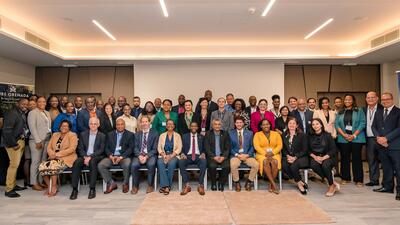Aid for trade
ITC’s new Executive Director examines the successes of Aid for Trade, the importance of WTO’s Ninth Ministerial Conference and ITC’s support for SMEs.
This is my first message to the readers of this magazine since my appointment to the position of Executive Director of the International Trade Centre (ITC) in September 2013. International Trade Forum is an excellent resource for those with an interest in seeing how trade and development work and in hearing from some of the most experienced and passionate voices in this line of work. I am particularly pleased that this issue focuses on Aid for Trade.
I have been a staunch believer in the potential of Aid for Trade as a platform of growth since it was launched in 2005. Aid for Trade has been fully incorporated into the work of ITC and has been an unquestionable success. More than US$ 200 billion has been mobilized, with some US$ 60 billion directed towards least developed countries. As the many stories in this issue of International Trade Forum illustrate, Aid-for-Trade assistance has increased trade, created jobs and sustained growth. The results are particularly impressive given that they have been achieved during the most severe global financial crisis since the Great Depression.
Despite these successes, however, now is not the time to rest. Billions of people continue to live in poverty without any immediate employment prospects and, as Karel De Gucht, the European Commissioner for Trade, points out, there is much work still to be done, particularly in integrating businesses from the poorest countries into global and regional value chains.
When global leaders meet in Bali, Indonesia, in December, for the World Trade Organization’s Ninth Ministerial Conference, an agreement on trade facilitation – as well as on services – has the potential to unlock employment opportunities for millions of people across the developing world, as well as in developed countries. But a deal in Bali will not suffice. We have to look beyond the immediate future. The World Bank, for example, has suggested that it is possible to eradicate poverty by 2030. This is possible, but it can only be achieved by creating more jobs and more growth through trade. ITC fully supports the emphasis on small and medium-sized enterprises (SMEs) in the United Nations emerging post-2015 development agenda. SMEs must become key drivers of global efforts to unlock growth, reduce poverty and deliver sustainable livelihoods.
We might have reached a critical point for Aid-for-Trade flows from developed countries. Increasingly, though, these are being replaced or supplemented with trade-related capacity building from emerging and advanced developing countries. They, too, see the benefits of the initiative and have a huge interest in investing in and trading more with other developing countries. Equally important is the growing interest – and participation – from the private sector, which is also starting to play a critical role as a partner and donor.
At ITC, we see Aid for Trade in action on a daily basis. In fact, all of our work is related to Aid for Trade: through joint projects under the Enhanced Integrated Framework, in partnership with our donors, or collaborations with recipient countries. At ITC, we are determined to ensure that SMEs continue to have the right set of skills needed to create jobs and so continue to be the engines of global growth.















